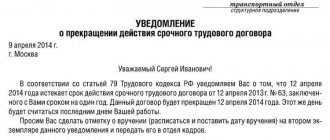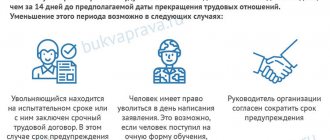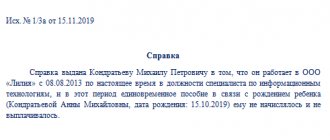If an employee was on vacation and fell ill: registration of sick leave according to the Labor Code of the Russian Federation
In accordance with the provisions of Art.
124 of the Labor Code of the Russian Federation, if an employee falls ill during vacation (classified as annual and paid), the employer is obliged to extend the employee’s vacation for the period of sick leave or postpone the vacation to another period (the specific option is determined through negotiations between the employee and the employer). Is sick leave extended with a child? If it is not the employee himself who is ill, but a member of his family who requires care during the period of illness, then this fact does not oblige the employer to extend the employee’s leave (Definition of the RF Armed Forces dated February 28, 2013 No. APL13-18).
Is sick leave extended if the leave is educational? If the vacation is classified not as annual paid (main or additional), but as any other, even educational with preservation of wages, then the illness of an employee on such vacation is not a legal basis for the employer to have an obligation to extend or postpone the vacation. However, at the end of such leave, if the employee continues to be ill, he is paid disability benefits in the prescribed manner.
If an employee is on maternity leave and has a complicated birth, then the leave is extended according to the corresponding certificate of incapacity (clause 48 of the Procedure, approved by order of the Ministry of Health and Social Development of Russia dated June 29, 2011 No. 624n).
And if your employee fell ill the day before the vacation, but did not notify you properly, do they have the right to extend the vacation? The answer to this question was explained by ConsultantPlus experts. Get trial access to the system and study the authoritative opinion of experts for free.
You can learn about the nuances of accrual of sick leave in the article “How is sick leave paid during vacation?”
Period of incapacity
The legislation does not indicate exactly how many days during the annual vacation a person can get sick.
However, it has been established that the duration of outpatient treatment cannot exceed 15 calendar days. Moreover, if the employee does not recover, the medical commission has the right to increase the period of incapacity for work.
Order of the Ministry of Health and Social Development of Russia dated June 29, 2011 N 624n:
For outpatient treatment of diseases (injuries), poisonings and other conditions associated with temporary loss of citizens’ ability to work, the attending physician alone issues certificates of incapacity to citizens for a period of up to 15 calendar days inclusive. For periods of temporary incapacity for work exceeding 15 calendar days, a certificate of incapacity for work is issued and extended by decision of the medical commission appointed by the head of the medical organization.
Not a single legal act specifies how many days a person can spend for treatment while on vacation.
Therefore, even if an employee has not recovered during the rest period, he is not required to go to work until the sick leave is closed .
Download and print for free
Order of the Ministry of Health and Social Development of Russia dated June 29, 2011 no. 624n
How long is sick leave extended (which affects the number of days of extension)
Annual leave can be increased by the number of days indicated on the certificate of incapacity for work as sick time. It is taken into account that days falling on holidays, based on the provisions of Art. 120 of the Labor Code of the Russian Federation, are not counted in the total number of calendar days when extending vacation. Please note that the employee does not have to present this sheet during the period of vacation and its extension: you can bring it when going to work. However, the employee is obliged to notify the employer of his illness.
If an employee falls ill and recovers during vacation, then this vacation is extended by the duration of the sick leave upon its closure or is postponed to another period in the manner determined by the agreement between the employer and the employee.
Usually, the employee is not required to write an application for the extension of leave (the Labor Code of the Russian Federation does not provide for it), and the corresponding order about this is not issued.
If a sick employee does not return to work after vacation without notification of illness, the employer in any case needs to wait until he comes out and brings a certificate of incapacity for work, which will reflect the actual duration of the person’s treatment during the vacation period.
Note! If an employee decides to extend his vacation without informing the employer of the certificate of incapacity for work, his absence from work may be regarded as absenteeism.
To record such a violation of labor discipline, the employer draws up a report stating that the employee is not at the workplace. The absence of an employee is documented every day until he returns to work. The employee will be asked to provide a written explanation upon returning to work.
And if an employee miscalculates the number of days during an unauthorized extension of vacation (if there are fewer days on sick leave than the number of days absenteeism has been issued), disciplinary sanctions may be applied to him, up to and including dismissal for absenteeism (clause 6a of article 81 Labor Code of the Russian Federation).
But if the number of days on sick leave and absences from work after vacation coincide, then no disciplinary action will follow, since according to Art. 124 of the Labor Code of the Russian Federation, the next vacation must be extended by the employer in case of temporary disability of the worker (without any additional conditions).
Legal norms
General provisions regarding the possibility of using the non-vacation period are indicated in paragraph 1 of Art. 124 of labor legislation, however, the specific decision is regulated by the clauses of the labor contract signed with the employer.
How an employee has the right to dispose of days lost during illness is explained by the norm adopted back in Soviet times. The rules on vacations were approved by the NKT No. 169 of April 30, 1930. In particular, paragraph 18 defines:
- The right to re-negotiate a new vacation period if the certificate of incapacity for work was opened before the start of the vacation.
- The ability to automatically add days in an amount equal to the time spent on sick leave on the dates of a previously agreed vacation period (vacation is extended exactly as many days were spent on sick leave).
- Transfer to a new period in agreement with the administration.
It is important to remember that you can only transfer the next paid vacation officially stipulated by law. Time off, even if it was previously agreed upon with the administration, cannot be transferred due to illness; however, the law does not prohibit the parties from re-agreing days off after returning to work after illness.
Extension and payment of leave for the period of sick leave: nuances
Sick leave on vacation is paid on the same basis as usual (if we are talking about annual leave).
At the same time, sick leave is not paid if:
- on study leave and vacation at your own expense (subclause 1, clause 1, article 9 of the Federal Law “On compulsory social insurance...” dated December 29, 2006 No. 255-FZ);
- on maternity leave;
If an employee, while on regular leave, receives sick leave for pregnancy and childbirth, then the leave is extended or postponed. How to correctly extend or postpone a vacation, as well as how to take such a transfer into account in accounting and tax accounting, is described in detail in ConsultantPlus. You can find out the answers to these and other questions for free by getting trial access to the K+ system.
- on parental leave, unless the parent caring for the child is registered for part-time work (clause 22 of the Procedure for issuing certificates of incapacity for work, approved by order of the Ministry of Health and Social Development of Russia dated June 29, 2011 No. 624n);
- on annual leave when caring for a sick relative (clause 40 of the Procedure approved by Order No. 624n).
Sick leave will be paid upon returning to work during the issuance of either an advance payment or a salary. You can present a sick leave certificate for payment no later than 6 months from the date of its closure.
How is sick leave extended during the holidays? The days of extended leave due to illness do not include those days that coincide with non-working holidays determined in accordance with Art. 112 Labor Code of the Russian Federation.
The payment that an employee receives upon returning from extended sick leave is disability benefits, not vacation pay.
If a person goes on vacation with subsequent dismissal, then in case of illness during the vacation period, disability benefits must be paid to him. This benefit is calculated based on the duration of sick leave (which is reflected in the certificate of incapacity for work) in the usual manner. If the vacation followed by dismissal has ended, the former employee of the company has fallen ill and by that time 30 days have not passed since the dismissal, then compensation for sick leave must also be provided to the employee (determination of the RF Armed Forces dated November 23, 2015 No. 34-KG15-13). True, in a significantly smaller size.
You can read in this article exactly how much compensation is calculated for sick leave for employees on the company's payroll, as well as for employees who were fired and fell ill within 30 days after dismissal.
How to postpone the period of the next paid vacation while on sick leave?
If an employee falls ill before a vacation or during a vacation, he has two options:
- extension of leave by the corresponding number of calendar days for sick leave;
- transferring leave due to sick leave to a later period (either the entire leave can be postponed if the incapacity for work occurred before the start date of the holiday, or the part not taken off if the employee fell ill while already on leave).
If an employee wishes to extend his leave, he must immediately notify the employer of his illness in any available form. In this case, the employee also notifies management of his intention to extend the vacation, and provides the certificate of incapacity for work at the place of work after returning from vacation.
Important! It is necessary to correctly calculate the number of days of vacation transfer. The transfer is carried out for the number of calendar days that fell on sick leave. In this case, according to the rules for calculating vacation days, weekends should be taken into account, but holidays should be excluded.
This means that if the initial vacation ended on Friday, but the employee expected to go to work on Monday, then even if he has two days of sick leave on hand, it will not be possible to postpone the time of going to work; he will still have to start performing his job duties on Monday. It should also be taken into account that the transfer of weekends (for example, during the New Year holidays) does not apply to holidays.
To learn how not to make mistakes when calculating vacation days, read the material “Calculating the number of vacation days in 2021 - an example.”
If an employee wishes to postpone his vacation to a later time, this can only be done in agreement with the employer. It should be noted that if production needs do not allow the employer to let the employee go on vacation at the desired time outside the vacation schedule, then this employee will have to think about other dates.
How to reflect information about the transfer of vacation in the vacation schedule? How to reflect the transfer on an employee’s card? Should the employee be notified of the start time of the rescheduled vacation? The answers to these and other questions are in the ready-made solution “ConsultantPlus”. If you don't already have access to the system, get a free trial online.
But at the same time, the Labor Code allows a maximum period for using vacation - 12 months from the end of the working year (non-calendar) for which this right to vacation is due.
Important! Extension or postponement of leave during sick leave is possible only if the employee himself falls ill. If a certificate of incapacity for work was issued to care for a child or other family member, then the employer does not have an obligation to change the rest period. This is confirmed by judicial practice (for example, the appeal ruling of the Tyumen Regional Court dated August 10, 2015 in case No. 33-4702/2015).
Transferring and paying leave after sick leave: nuances
As we noted above, instead of extending vacation for the duration of sick leave, the corresponding vacation can be postponed by agreement between the employee and the employer. For example, this option is optimal if the employee has fully recovered by the end of the initially established vacation period, feels well and does not need additional days of rest.
To implement the corresponding transfer, the employee must, after returning to work, send to the personnel service an application for the transfer of additional vacation days that he acquired due to illness that were not used immediately. Based on this application, as well as the certificate of incapacity for work, the personnel service makes the necessary adjustments to the organization’s vacation schedule.
If the employee and the employer have agreed to postpone the leave that the employee took due to illness, then the employer will be obliged to calculate the benefit on the certificate of incapacity for work based on the person’s average earnings for the period preceding the employer’s obligation to provide this benefit. That is, when calculating benefits, the vacation taken by the person who was on sick leave will also be taken into account.
When transferring the remainder of the vacation to another period, a situation often arises when the amount of funds actually paid before the vacation exceeds the amount of the benefit itself. At the same time, vacation pay is subject to recalculation (since the actual vacation time has changed). What to do in this case? You cannot simply withhold these amounts from your salary (Article 137 of the Labor Code of the Russian Federation). You can only offset accruals for sick leave against the resulting overpayment for vacation pay. However, this is only possible with the consent of the employee, and in writing.
Sick leave pay during vacation
The sick leave that the employee brought after vacation must be paid in any case (if a child was sick, then only for days that did not coincide with the “vacation” period). Moreover, the benefit is assigned for all calendar days of illness, including weekends and holidays (clause 8, article 6, clause 1, clause 1, article 9 of the Federal Law of December 29, 2006 No. 255-FZ).
As for vacation pay, they need to be recalculated only if the employee decides to postpone his vacation due to illness. After all, in this case, it is considered that he did not use part of the declared vacation (the part that fell on the days of illness) as planned, and has already received payment for it. This means that we can say that the company overpaid him, and the employee is obliged to return part of the vacation pay he received earlier.
Usually no money is deposited, and the organization simply reduces the following amounts due to the employee (for example, from the amount of the next salary). In this case, it is better to obtain written consent from the employee for such a reduction. By the way, it can be included in the application for transferring vacation days.
When the employee completes the postponed vacation days, vacation payments will need to be accrued again.
As in the program “1C: ZUP 8” ed. 3 register sick leave received by the accounting department after a vacation?
Is additional leave due to sick leave extended?
Annual paid leave - the one that is extended or transferred in the event of an employee's illness - can be basic or additional (which can be established on the grounds defined in the Labor Code of the Russian Federation, or in accordance with local regulations of the employer company).
It does not matter what type of leave the employee uses when it is extended due to the employee’s illness. For both types of leave - both main and additional - you can choose the option of extending leave after sick leave or transferring it by agreement between the employee and the employer.
The calculation of compensation for the certificate of incapacity for work of an employee who went on sick leave during the vacation period can be carried out using the popular program “1C: ZUP”. If a company employee goes on sick leave while on vacation, how to extend the vacation using this software?
Examples of calculating vacation transfer days
The employee is on vacation from July 4 to July 15, and has sick leave from July 11 to 14.
If the vacation is postponed, the first day of his return to work is July 18.
The employee is on vacation from June 06 to June 17, and has sick leave from June 07 to June 10.
During his sick leave, the holiday falls on June 12th. This holiday is included in the vacation, so the first day of leaving the vacation when transferring is June 24, however, if this day falls on a weekend that was postponed to a working day, then it is not taken into account, and the date of release is a day earlier.
Maternity payments in 2021 - find out full information.
You can find out how to correctly calculate the average daily earnings taking into account sick leave here.
Read about the child tax deduction in this article.
Features of using “1C: ZUP” (extension of leave due to sick leave)
Sick leave compensation can be calculated using the 1C: ZUP program.
The accountant must adjust the employee's original vacation taking into account the sick leave reflected in the program.
To reflect sick leave due to vacation, in 1C:ZUP you will need:
- in the “Payroll calculation” section, select “Sick leave accruals”, then “Add”;
- enter data on sick leave;
- open the completed “Vacation accrual” document, in which the amount of vacation pay is calculated (it was generated before the employee went on vacation), then click on “Correct”;
- adjust the duration of the vacation, which will be increased by the number of days of sick leave or transferred, then click on “Calculate”.
How to recalculate vacation pay?
The amount of vacation pay must be recalculated depending on the period to which the employee’s vacation is postponed. If the date of the first day of vacation and the date after its transfer fall within the same calendar month, then there is no need to recalculate vacation pay.
If the rest days are moved to another month or year, then the billing period also changes, and therefore, possibly, the average earnings. In such a situation, the amount of vacation pay is recalculated. Payment of sick leave during vacation is calculated according to general rules .
What will happen and what to do if the funds have already been paid?
In accordance with Art. 137 of the Labor Code of the Russian Federation, the employer has the right to withhold, without the employee’s consent, part of the funds that were paid to him as vacation pay from his salary only in the event of his dismissal.
If funds for legal vacation have already been paid, then there is no need to return them - the law does not say this anywhere.
If, after recalculating the amount of vacation pay, it turns out that the money paid is more than the required amount, then the employer has the right to withhold the overpaid part from the next payment of money to the employee. In such a situation, the employee's written consent is required. There is also the option to count the difference in money already paid as an advance on future wages.
Read about whether sick leave is included in the calculation of vacation pay, and how rest days affect accrual according to the ballot.
An employee who falls ill during his legal vacation should take care to notify his superiors about his desire to reschedule his vacation. It is important to agree on this point in advance to avoid unpleasant situations. After returning from vacation and sick leave, you will need to write an application and provide a sick leave certificate , on the basis of which the employer will be able to issue an order to postpone the employee’s legal rest.
Results
If an employee on vacation falls ill, the employer is obliged to extend the employee’s vacation by the number of days of sick leave or transfer the added vacation to another period. Both main and additional leave can be extended or postponed. Among the most convenient accounting programs for reflecting the extension of sick leave in accounting is 1C:ZUP.
You can learn more about the specifics of using sick leave at an enterprise in the following articles:
- «Direct payments from the Social Insurance Fund from 2021«;
- “How to calculate sick leave?”;
- “What percentage of your salary should you pay for sick leave?”;
- “What are the nuances of paying for long-term sick leave?”;
- “Is sick leave (sick leave) subject to personal income tax?”.
Sources:
- Tax Code of the Russian Federation
- Labor Code of the Russian Federation
You can find more complete information on the topic in ConsultantPlus. Free trial access to the system for 2 days.
Accounting for leave postponed due to illness
In accounting, you need to reverse part of the vacation pay (we remind you that we are talking about a situation where an employee decides to transfer “extra” vacation days to the future). This must be done at the moment when the employee submits an application for transfer of leave along with sick leave and the organization will accrue sick leave based on the leave.
As for tax accounting, the amount of vacation pay, as is known, is included in labor costs (clause 7 of Article 255 of the Tax Code of the Russian Federation). If vacation pay is subsequently recalculated downward, how can this be done in tax accounting? Through a decrease in previously recorded expenses or through the reflection of the recalculation amount (reimbursed by the employee) as part of non-operating income?
There are different opinions among experts. Unfortunately, there are no clear explanations from officials on this matter. There is only one old letter from the Ministry of Finance of Russia dated December 3, 2009 No. 03-03-05/224, in which officials in similar cases advise including compensation amounts in income.
Since there is no clarity on this issue, the company can choose any of the options and write it down in its accounting policies. Or contact your tax office and act based on the answer received.
Renewal and transfer: the difference in money
The material component of these types of vacation compensation is different.
Extension of vacation for days constituting incapacity for work involves the calculation of vacation funds. And when transferring, the billing period will be a different period that does not coincide in time with the vacation period, so the amount will be different, usually somewhat less.
The vacation pay received by the employee will thus turn out to be more than he was entitled to: after all, the vacation or part of it turned out to be unused. None of the employees is obliged to return the surplus; the law also does not allow it to be deducted from wages. The employer can only count them against subsequent payments.
Sick leave on vacation followed by dismissal
An employee may write an application for leave followed by dismissal and become ill during it. In this case, the employer must pay for the certificate of incapacity for work in full, even if it is closed after the employment contract has been terminated (Article 5 of Federal Law No. 255). A person can present sick leave for payment within six months after recovery.
However, the question arises whether the next vacation should be extended in this case. This issue is not specified in the Labor Code, so disagreements arose for a long time. In 2007, the Constitutional Court issued Ruling No. 131, which clarified this point. According to the document, the actual day of termination of the employment relationship is the last working day before the vacation. Based on this, Rostrud, in a letter dated December 24, 2007, recommended that all personnel documents be drawn up and payments made to the employee before going on vacation. After its end, the legal relationship between the employee and the employer ceases, and there are no grounds for extending the leave.
It also makes no actual sense. Since sick leave must be paid in any case, the person does not incur financial losses. An extension of vacation is not always necessary for the employee himself. As a rule, a person already has plans for what he will do after dismissal. This could include getting another job. In this case, the extension of leave deprives him of the opportunity to immediately begin performing duties in a new place.
Manager's procedure
As for an employer who receives notice of the illness of an employee on vacation, he only needs to take certain actions if a decision is made to postpone the vacation. The extension does not require any special accounting documentation. If an application is received from a recovered employee to postpone this period, the employer must proceed according to the following scheme:
- an order is issued to postpone or add a certain number of days to the next vacation (by written agreement with the employee);
- the accounting department makes payments for sick leave;
- “sick leave” clarifications are entered into the employee’s time sheet.
FILES
If the sick leave was issued abroad
If an employee’s temporary disability occurred during a vacation period when he was abroad of the Russian Federation, then in the territory of a foreign state he must receive documents confirming this.
However, benefits cannot be paid based on these documents. First, you need to obtain a sick leave certificate in accordance with the form valid in the Russian Federation.
In accordance with clause 7 of the Procedure for issuing certificates of incapacity for work, documents confirming the temporary disability of citizens during their stay abroad (after a legalized transfer), by decision of the medical commission of a medical organization, can be replaced with certificates of incapacity for work of the standard standard in the Russian Federation.
Accordingly, after an employee receives sick leave valid in the territory of the Russian Federation, annual paid leave is extended for the period of temporary disability.









